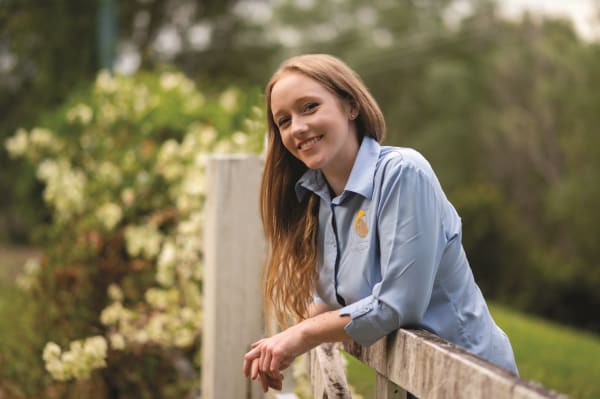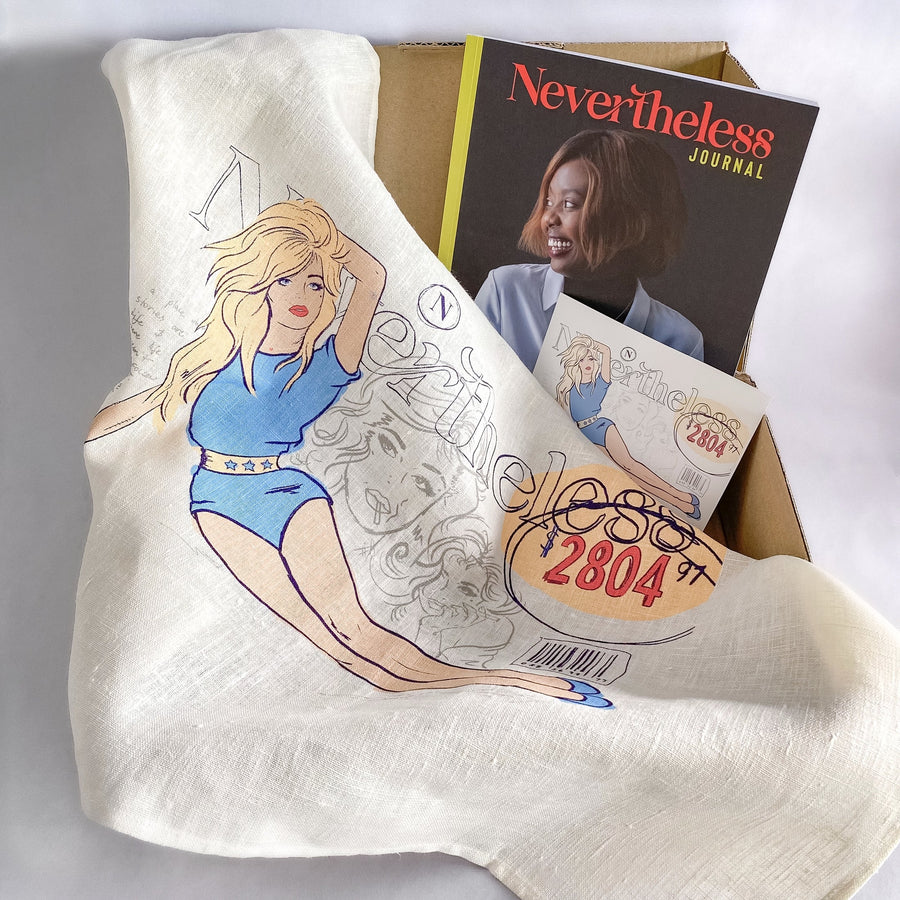Future In Focus: Katura Halleday

Words by Natalie O'Driscoll
Photos by Simone Gorman-Clark
Every extraordinary woman was once an extraordinary girl. Each generation of women passes the baton to the next, hopeful that the lives of those who come after them will be a little bit easier, a lot more equal, and teeming with opportunity. In this series, we will meet women leaders of the future, girls who are strong, talented, compassionate and innovative. Girls who inspire. Girls who are continuing to make the world a better place.
In this edition we chatted to Katura Halleday. Seventeen-year-old student and accomplished artist Katura has been involved in philanthropic ventures since the tender age of 11. Her passion lies in the education of girls in developing countries.
With that goal in mind, Katura has developed her own charitable organisation and event, 8x8 to Educate, an annual art auction that has raised thousands of dollars for the schooling and tertiary education of 15 girls in Mozambique and Tanzania, as well as a literacy program and menstrual product solutions.
It’s an impressive achievement on its own, but even more so when you consider that Katura is still managing to kick goals in her final year of school, hold down a couple of jobs, speak at public events and practice her art. Needless to say, there’s not a lot of room in her life for your average teen social activities. But there’s no slowing down in sight for this unstoppable visionary.
Meet Katura.
Tell me a little bit about your first memory of art, and when the art bug really hit you.
I don’t really have a specific memory of when art came into my life – it was always there, even before I started school there was always art on the dining room table – I don’t think it I actually have a natural talent either, it was something I had to work hard for, I attended lots of workshops and classes to try and hone my skills over the years and they have played off. So, in that sense anyone can really be an artist, some may me slightly more naturally inclined to learn faster, but everyone has the ability, but its like anything you need access to the education.
When did you first become passionate about education in developing countries and what was the catalyst for it?
I’ve been passionate about education since I was about 11 when I went on a family holiday to Fiji. While we did the touristy things mum also took us all to a village to see what life in other places in the world was like and that was the beginning of my interest.
The catalyst however was a girl named Celia who I met in Mozambique two years later. She was just like me, had hopes dreams and passions and yet we lived very different lives. Mine was one of opportunity and hers of poverty. She was about to be forced to leave school because her mother couldn’t afford to feed her family and pay school fees.
Celia’s family of five lived in a small cement brick room without windows and a roof made of rusted tin held down with string. The family had a couple of cups and plates as well as a singular pot sitting outside on the small pile of coals. Next to their fire (their kitchen) was their bathroom which was some sticks holding up pieces of plastic they had scrounged up from the rubbish.
Here was this girl, just like me and yet our futures were so different, and I couldn’t wrap my head around what made me any more deserving of a good education and future than her. So, when I came home, I decided to do something, and so I engaged the arts community to raise money for her education as well as two other girls, and I got to see how feasible it could be to help give these girls the power to lift themselves out of poverty.
The work has continued to grow and now helps 15 girls as well as another 38 who are part of a new literacy polit program we are facilitating in Mozambique.

Can you give me one story of your experience in Mozambique that really sums up the people and situation over there?
I walked into a year eight class and three of the female students were pregnant, one was about to have her second child. In my next class I was propositioned for marriage, at 13. To me that really solidified the differences in our society and how little a value was placed on a woman’s education. How limited her financial options were. A lot of them were seen as wombs and not people. But allowing then to go to school and get an education was a key way to help break that cycle of poverty and give these girls an element of financial independence.
Talk to me about the kind of feelings that you felt when you were in Mozambique.
They were probably the happiest people I’ve ever met, generous too. I was invited to the home of a young boy (8 years old) who wanted to be an artist. When we got there, they fed us a substantial meal even though they could barely afford to feed themselves, all because they wanted us to feel very welcome in their home. Pretty much everyone we met was like that, constantly wanting us to feel welcomed and happy. The trip itself was filled with these little moments of the greatest displays of human kindness and generosity I’ve ever experienced.
One of my favourite memories was of lunchtimes at the school when I would take a stick of bubbles and run around with them and I would always have about 100 -150 young children chasing after me trying to get to the bubbles. After the first time I did it they would wait outside the office were we would eat and stick their heads in the door and wave at me to come and blow the bubbles because they were so excited. That trip taught me a lot about joy and being grateful for what you have.
Can you please explain a little about the growth of 8x8 to Educate from when you started to now?
When I started 8x8 to Educate I would have never thought it could have grown into what it is now, especially not within the four years it has been operating.
It started as an idea to educate on girl with a target of making $3,300 for our first exhibition. We were greeted by the arts community with so much enthusiasm and support. So much support that on our first night we surpassed our goal for the week-long exhibition by selling every artwork on the wall and raising over $9,000 in two hours, meaning we could educate more girls. After such a success I decided to make it annual event.
Despite facing hailstorms, cyclones and COVID-19 we continue to grow every year. We now have a formal scholarship program in Africa across two countries (Mozambique and Tanzania). Most recently in 2021 we raised over $14,000 over the week long exhibition with a further $2000 in online sales. We now support the education of 15 girls and have established a literacy and human rights program for 38 girls.
We have expanded into a dignity project and helped provide solution to over 72,000 periods with reusable pads and a menstrual health education class.
None of this would possible without the arts community which has backed us wholeheartedly from day one. They have embraced the project with so much love and support and that has been evident in the impact 8x8 has been able to make.
Everyone of all ages enters, from five-year-olds handing in their pieces they made in kindy to world renowned artists always making the time to create a piece, they are all helping change lives.
Locally we have had an impact also. We have had artists enter the 8x8 Awards for the first time and then go on to develop art careers with the confidence to display art in more established awards.
One of my favourite stories though comes from our oldest entrant who in her nineties entered her first piece and has sold her work every year. That smile when she came in to the exhibition and saw her red ‘sold’ dot was priceless.
Why is a push for education in developing countries so important?
According to UNICEF, there are currently 129 million girls around the world who don’t have access to an education. When a girl gains access to education, they increase their confidence and it gives them better opportunities in the future, allows them to earn an income, can give them more independence, and a more comprehensive understanding of their rights.
Other benefits include reduced child mortality rates, keeping them out of early marriage and increasing their countries’ wealth.
It like Bill Gates said, ‘why should we waste 50% of our resource talent?’ There are so many girls who could change the world who are lost to poverty, and the best way to give them the opportunities they need is to give them an education and empower them.
What are your dreams for the future?
Of course I plan to continue to Grow 8x8 to Educate so that we can help empower a strong cohort of young female leaders.
I spoke about Celia, an intelligent, kind, amazing young girl whose abilities would have been lost to poverty. I want to work towards a day where the world doesn’t miss out on a single amazing girl like Celia.


